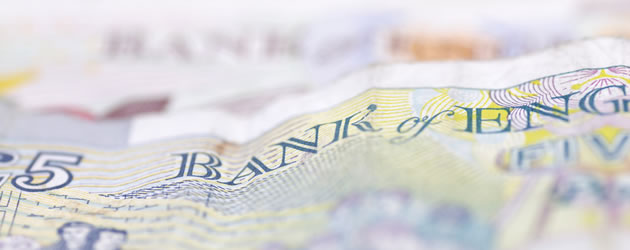
The Pound Sterling to Euro exchange rate spent much of last week trending in a weaker position.
While the appeal of the Euro was compromised by less-than-impressive fundamentals from the Eurozone (including concerning ZEW economic sentiment surveys, an unexpected decline in industrial production and concerning growth figures for the currency bloc and its largest economies) the Pound had a really dire week.
Sterling eased lower against almost all of its currency counterparts over the course of the five days as months of Bank of England rate hike speculation dwindled in reaction to surprising UK developments.
Economists hadn’t expected much from the UK’s wage data, but the figure delivered was even worse than feared.
Wage growth is now running far below the rate of inflation – a fact which is likely to limit consumer spending and could put the kibosh on the UK’s so far resilient recovery.
This news outweighed a moderate decline in the level of UK joblessness and saw Sterling drop across the board.
Losses were compounded after the Bank of England used its quarterly inflation report to slash its forecasts for future wage growth. The BoE had previously looked at the unemployment rate as the main guiding factor for setting an interest-rate increasing timeline, but the central bank now intends to monitor wage growth – which could mean a rate hike is a long way off.
The Pound posted three days of declines against the Euro and ended the week lower against the US Dollar.
Not even the news that the UK’s year-on-year GDP for the second quarter had been positively revised was enough to give the Pound a boost.
The UK economy was shown to have expanded by 3.2% in the second quarter year-on-year (growth of 3.1% had been anticipated) having grown by 0.8% on a quarter-on-quarter basis.
In the view of London-based currency strategist Simon Derrick; ‘The key that drove Sterling in the second quarter of this year was quite specifically the expectation that the Bank of England was going to be ahead of central banks in terms of hiking rates. It’s about the interest-rate story rather than anything else and I don’t think that GDP number radically changes the picture.’
Pound Sterling to Euro (GBP/EUR) Exchange Rate Forecast
While things look a little bleak for the Pound at the moment, the GBP/EUR pairing could recover some ground over the next five days if this week’s run of UK reports deliver on or above target results.
So let’s take a better look at the UK news…
RIghtmove House Price figures: As the threat of an overheating housing market drove interest rate hike speculation earlier in the year, signs of continued strength in this sector could cause renewed speculation, potentially causing modest Pound gains.
Consumer Price Index: Inflation is currently running just below the Bank of England’s 2% target. However, if inflation were to accelerate suddenly it would put pressure on the BoE to take defensive action. If the data shows a surprisingly strong increase in consumer prices in July it could cause Pound volatility.
UK Retail Sales: Retail Sales have been struggling of late, no doubt in part because of the stagnancy of average wage growth. A rebound in sales would show that consumers remain confident in spite of their restricted circumstances and would be Pound beneficial.
If these reports impress and those from the Eurozone continue to fall short of expectations, the Pound Sterling to Euro exchange rate could recover some ground this week.

Comments are closed.